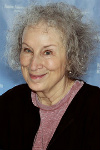 Morning in the Burned House by Margaret Atwood
Morning in the Burned House by Margaret Atwood Published by Mariner Books on September 16, 1996
Genres: Poetry
Pages: 144
Format: Paperback
Purchase at Bookshop.org
Add on Goodreads

These beautifully crafted poems - by turns dark, playful, intensely moving, tender, and intimate - make up Margaret Atwood's most accomplished and versatile gathering to date, " setting foot on the middle ground / between body and word." Some draw on history, some on myth, both classical and popular. Others, more personal, concern themselves with love, with the fragility of the natural world, and with death, especially in the elegiac series of meditations on the death of a parent. But they also inhabit a contemporary landscape haunted by images of the past. Generous, searing, compassionate, and disturbing, this poetry rises out of human experience to seek a level between luminous memory and the realities of the everyday, between the capacity to inflict and the strength to forgive.
I’ve read several of Atwood’s books over the years, but that’s not why I picked this one up, even though I do enjoy the short pieces of hers I’ve read. When we heard Louise Penny speak, she said that several pieces of the poetry in her Gamache series come from Morning in the Burned House.
The poems are lovely and dark and sad. They are full of feminine power and grief, truth and mythology, anti-war messages and pro-environment. I love how the words sounds and feel, how the phrases at times are just perfect, although not always. Not every poem struck me, but enough did to make this worth reading.
I wanted to give you a few bits, but taking out a few lines from the poetry doesn’t really give you the feel, takes away the meaning and most of the feel of the poems.
I will give you a middle bit from “The Loneliness of the Military Historian”, but you can find the whole poem on-line at the Poetry Foundation.
Confess: it’s my profession
that alarms you.
This is why few people ask me to dinner,
though Lord knows I don’t go out of my way to be scary.
I wear dresses of sensible cut
and unalarming shades of beige,
I smell of lavender and go to the hairdresser’s:
no prophetess mane of mine,
complete with snakes, will frighten the youngsters.
If I roll my eyes and mutter,
if I clutch at my heart and scream in horror
like a third-rate actress chewing up a mad scene,
I do it in private and nobody sees
but the bathroom mirror.
In general I might agree with you:
women should not contemplate war,
should not weigh tactics impartially,
or evade the word enemy,
or view both sides and denounce nothing.
Women should march for peace,
or hand out white feathers to arouse bravery,
spit themselves on bayonets
to protect their babies,
whose skulls will be split anyway,
or, having been raped repeatedly,
hang themselves with their own hair.
These are the functions that inspire general comfort.
That, and the knitting of socks for the troops
and a sort of moral cheerleading.
Also: mourning the dead.
Sons, lovers, and so forth.
All the killed children.
Instead of this, I tell
what I hope will pass as truth.
A blunt thing, not lovely.
The truth is seldom welcome,
especially at dinner,
though I am good at what I do.
My trade is courage and atrocities.
I look at them and do not condemn.
I write things down the way they happened,
as near as can be remembered.
I don’t ask why, because it is mostly the same.
Wars happen because the ones who start them
think they can win.
Some of my other favorites were “Red Fox,” “Half-Hanged Mary” who was hung as a witch in Massachusetts but didn’t die, and “Helen of Troy Does Counter Dancing.” If nothing else, it reminded how much I enjoy poetry. I love the economy of words, the boiling down feelings, thoughts, events to their essence.
